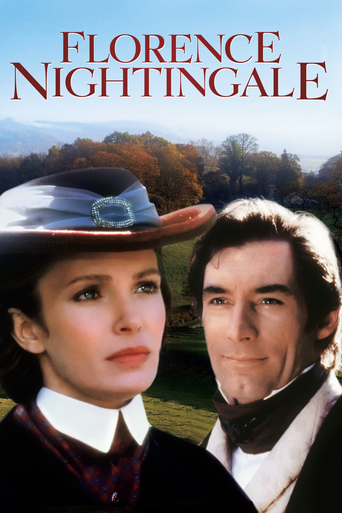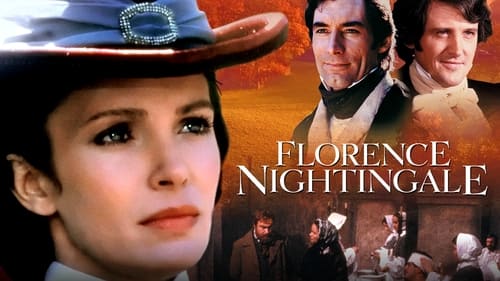James Hitchcock
Florence Nightingale has long been a revered figure in Britain, so much so that she has even been officially canonised by the Church of England, so it is not surprising that a number of films have been made about her life, the most famous of which is probably "The Lady with the Lamp" with Anna Neagle from 1951. (I must admit that I have never seen any of them). Nightingale had many achievements to her credit; she was the founder of modern nursing, a celebrated social reformer and also a gifted mathematician and statistician, being regarded as a pioneer of statistics as an intellectual discipline. Her prominence in the public's imagination, however, largely rests upon her role as a nurse during the Crimean War. Most of the films I refer to earlier were made in the early twentieth century; the first dates from as long ago as 1912, only two years after her death. This television drama from 1985 is the only film about her in recent decades and, as one might expect, deals with her early years, up to and including her Crimean War experiences. When I recently reviewed "Grace Kelly", another eighties made-for- television biopic starring a former Charlie's Angel, in that case Cheryl Ladd, it struck me as an object lesson in how not to make a filmed biography, being quite devoid of any insight into what sort of person Kelly was or of any dramatic tension. Its only aim seemed to be to convey factual information; I could just as well have been watching a dramatisation of an encyclopedia entry. The lack of any physical resemblance between Ladd and the woman she was playing didn't really help matters. Certainly, Jaclyn Smith probably looks even less like Florence Nightingale than Ladd does like Grace Kelly, but that does not matter quite so much. Kelly was one of the iconic beauties of her generation, whereas Nightingale, although described by contemporaries as attractive in her youth, became famous for matters quite unconnected with her looks, and this film avoids most of those defects which so marred "Grace Kelly". A biopic needs to do more than simply narrate the facts; it also needs a narrative structure akin to that of a purely fictitious drama, and this can often be supplied by dramatising some conflict or struggle in the life of its subject. The story as told here is that of a strong woman who has to struggle against obstacles, both external social ones and internal psychological ones, in order to achieve her destiny. Nightingale's internal conflict is the one between her love for the poet and statesman Richard Monckton Milnes and her religiously-inspired sense of vocation as a nurse. In reality, Nightingale rejected Milnes after a nine year courtship, convinced that marriage would interfere with her ability to follow her calling, whereas in the film it is he who rejects her, a change probably made in order to soften her character. Nightingale's external conflicts are twofold. She initially experiences resistance from her family to the idea of her becoming a nurse- in the early nineteenth century nursing was not regarded as a fit profession for a young lady of quality- but this is soon overcome after she wins over her kindly, liberal father William. She faces more serious opposition to her plans to form a female nursing corps to nurse soldiers in the Crimean War. The British military establishment, including the Army Medical Corps, was particularly resistant to change- wounded soldiers had never previously been attended by female nurses- and tended to regard sick and wounded "other ranks" as expendable, even if their wounds had been incurred while performing some heroic action. Even here, however, Nightingale eventually succeeds in her goals, aided by allies such as the politician Sidney Herbert and the journalist William Russell, and by the fact that even the Army top brass cannot close its eyes to the dramatic reduction in the death rate achieved by her methods. Jaclyn Smith was easily the most beautiful of the various "Angels", with Tanya Roberts her only serious rival in that department. (I realise that will be a controversial statement, but then I am one of the few heterosexual males of my generation not to have had a schoolboy crush on the artificial-looking Farrah Fawcett-Majors). Jaclyn also struck me as having a lot more talent than some of the other Angels, so I am always surprised that she never went on to become a major movie star, although she has remained a well-known figure on television. She acquits herself well here, showing that there was a lot more to her than just a bikini- clad beauty and that she was also capable of taking on leading roles in serious drama. The best of the supporting cast are probably Jeremy Brett as William and future James Bond star Timothy Dalton as Milnes. "Florence Nightingale" is informative, but also dramatically satisfying, the sort of biopic that works both as biography and as drama. It can serve as an object lesson in how to make a successful filmed biography. 7/10
Desertman84
Florence Nightingale is stirring TV movie from Emmy Award-winning director Daryl Duke and writers Ivan Moffat and Rose Leiman Goldemberg.It stars Jaclyn Smith in the title role together with Claire Bloom, Timothy Dalton and Jeremy Brett.It is based on the life of Florence Nightingale, an aristocratic woman who defied Victorian society to reform hospital sanitation and to define the nursing profession as it is known today. After volunteering to travel to Scutari to care for the wounded soldiers of the Crimean War, she was scorned by her community and faced great opposition for her new way of thinking. However, through her selfless acts of caring, she quickly became known as "The Lady with the Lamp," the caring nurse whose shadow softened those wounded. Jaclyn Smith is a curious choice to play the title character in the made-for-TV biopic Florence Nightingale. This fact, however, never enters into the consciousness of the viewer, thanks to her excellent performance. The best scenes--and the most accurate--occur during the Crimean War sequences and during Nightingale's strenuous efforts to form the Red Cross.Though it was slow moving and it drags,this biopic about the 'mother of modern nursing' stays close enough to the facts to be worthwhile, and has production values rich enough to make the it come alive.
speedo68
This movie created a lot of stir during the filming of the movie, with Jaclyn Smith playing the legendary British nurse and Anthony Richmond (Smith's husband-then) producing the film. But all in all, this is an outstanding production. From costume, cinematography, dialogues, setting and acting by all the cast.Jaclyn Smith, I reckon, delivers a very moving performance and she's wonderful in a period costume. Her on camera scenes with Timothy Dalton are absolutely exquisite (it's a pity, producers of the miniseries' "Scarlett" probably missed this film and didnt cast the two instead.)




